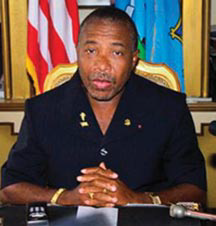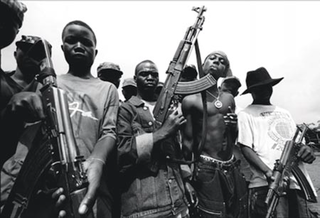 |
|---|
A constitutional referendum was held in Liberia on 3 May 1949. [1] The changes to the 1847 constitution were approved in the Legislature in 1948, and abolished the two-term limit on presidents. [1] The change was approved by voters. [1]
 |
|---|
A constitutional referendum was held in Liberia on 3 May 1949. [1] The changes to the 1847 constitution were approved in the Legislature in 1948, and abolished the two-term limit on presidents. [1] The change was approved by voters. [1]
The proposed changes would be to Chapter III. [1]
| Section | Original text | New text |
|---|---|---|
| Chapter III article 1 | The Supreme Executive Power shall be vested in a President who shall be elected by the people and shall hold office for a term of eight years. He shall be Commander-in-chief of the Army and Navy. He shall in the recess of the Legislature, have power to call out the Militia or any portion thereof, into actual service in defence of the Republic. He shall have power to make treaties, provided the Senate concur therein, by a vote of two thirds of the Senators present. He shall nominate, and with the advice and consent of the Senate appoint and commission, all Ambassadors, and other public Ministers and Consuls, Secretaries of State, of War, of the Navy, of the Treasury, Attorney General, all Judges of Courts, Sheriffs, Coroners, Marshals, Justices of the Peace, Clerks of Courts, Registers, Notaries Public, and all other officers of State civil and military, whose appointment may not be otherwise provided for by the Constitution, or by standing laws. | The Supreme Executive Power shall be vested in a President who shall be elected by the people and shall hold office for a term of eight years. No President may be elected for two consecutive terms of eight years, but should a majority of the ballots cast at a second or any other succeeding election by all of the electors voting thereat elect him, his second or any other succeeding term of office shall be for four years. He shall be Commander-in-chief of the Army, Navy and Air Forces. He shall in the recess of the Legislature, have power to call out the Militia or any portion thereof, into actual service in defence of the Republic. He shall have power to make treaties, provided the Senate concur therein, by a vote of two thirds of the Senators present. He shall nominate, and with the advice and consent of the Senate appoint and commission, all Ambassadors, and other public Ministers and Consuls, Secretaries of State, of National Defence, of the Treasury, Attorney General, all Judges of Courts, Sheriffs, Coroners, Marshals, Justices of the Peace, Clerks of Courts, Registers, Notaries Public, and all other officers of State civil and military, whose appointment may not be otherwise provided for by the Constitution, or by standing laws. |
| Chapter III article 5 section 1 | All Ambassadors and other public Ministers, and Consuls, the Secretary of State, of War, of the Treasury, and of the Navy, the Attorney General, and Postmaster General shall hold their offices during the pleasure of the President. Justices of the peace, sheriffs, coroners, marshals, clerks of courts, registers, and notaries public, shall hold their offices for the term of two years from the date of their respective commissions; but may be removed from office within that time by the President, at his pleasure: and all other officers whose terms of office may not be otherwise limited by law, shall hold their offices during the pleasure of the President. | All Ambassadors and other public Ministers, and Consuls, the Secretary of State, of National Defence, and of the Treasury, the Attorney General, and Postmaster General shall hold their offices during the pleasure of the President. Justices of the peace, sheriffs, coroners, marshals, clerks of courts, registers, and notaries public, shall hold their offices for the term of two years from the date of their respective commissions; but may be removed from office within that time by the President, at his pleasure: and all other officers whose terms of office may not be otherwise limited by law, shall hold their offices during the pleasure of the President. |
A two-thirds majority in the vote was necessary for the changes to be approved. [1]

Liberia, officially the Republic of Liberia, is a country on the West African coast. It is bordered by Sierra Leone to its northwest, Guinea to its north, Ivory Coast to its east, and the Atlantic Ocean to its south and southwest. It has a population of around 5.5 million and covers an area of 43,000 square miles (111,369 km2). The official language is English. Over 20 indigenous languages are spoken, reflecting the country's ethnic and cultural diversity. The capital and largest city is Monrovia.

The Armed Forces of Liberia (AFL) are the armed forces of the Republic of Liberia. Tracing its origins to a militia that was formed by the first black colonists in what is now Liberia, it was founded as the Liberian Frontier Force in 1908, and retitled in 1956. For almost all of its history, the AFL has received considerable materiel and training assistance from the United States. For most of the 1941–89 period, training was largely provided by U.S. advisers, though this assistance has not prevented the same generally low levels of effectiveness common to most of the armed forces in the developing world.

Charles McArthur Ghankay Taylor is a Liberian former politician and convicted war criminal who served as the 22nd president of Liberia from 2 August 1997 until his resignation on 11 August 2003 as a result of the Second Liberian Civil War and growing international pressure.

Samuel Kanyon Doe was a Liberian politician and military officer who served as the 21st President of Liberia from 1986 to 1990. He ruled Liberia as Chairman of the People's Redemption Council (PRC) from 1980 to 1986 and then as president from 1986 to 1990.

The president of the Republic of Liberia is the head of state and government of Liberia. The president serves as the leader of the executive branch and as commander-in-chief of the Armed Forces of Liberia.

George Manneh Oppong Weah is a Liberian politician and former professional footballer who served as the 25th president of Liberia from 2018 to 2024. Before his election for the presidency, Weah served as senator from Montserrado County. He played as a striker in his prolific 18-year professional football career which ended in 2003. Weah is the first African former professional footballer to become a head of state, and the only African Ballon d'Or and FIFA World Player of the Year winner in history, winning both awards in 1995. He won the African Footballer of the Year 3 times and is considered one of the greatest strikers ever.

Charles Dunbar Burgess King was a Liberian politician who served as the 17th president of Liberia from 1920 to 1930. He was of Americo-Liberian and Sierra Leone Creole descent. He was a member of the True Whig Party, which ruled the country from 1878 until 1980.

Elections in Liberia occur solely at the national level. The head of state, the President of Liberia, is elected to a six-year term in a two-round system, in which a run-off between the two candidates with the highest number of votes is held should no single candidate earn a majority of the vote in the first round. The Legislature has two elected chambers.

The Second Liberian Civil War was a civil war in the West African nation of Liberia that lasted from 1999 to 2003.

General elections were held in Liberia on 19 July 1997 as part of the 1996 peace agreement ending the First Liberian Civil War. The presidency, as well as all seats in the House of Representatives and the Senate were up for election. Voter turnout was around 89%. Former rebel leader Charles Taylor and his National Patriotic Party (NPP) won the election with 75.3% of the vote, giving it about three-quarters of the legislative seats according to the proportional representation system. Taylor was inaugurated as president on 2 August 1997.

The House of Representatives is the lower chamber of the bicameral legislative branch of Liberia, and together with the Senate comprises the Legislature of Liberia. The number of seats is fixed by law at 73, with each county being apportioned a number of seats based on its percentage of the national population. House members represent single-member districts within the counties drawn up by the National Elections Commission and serve six-year terms. The House meets at the Capitol Building in Monrovia.

The Senate is the upper house of the bicameral legislative branch of Liberia, and together with the House of Representatives comprises the Legislature of Liberia. Each of the fifteen counties are equally represented by two senators, elected to serve staggered nine-year terms. The Senate meets at the Capitol Building in Monrovia.

The Constitution of Liberia is the supreme law of the Republic of Liberia. The current constitution, which came into force on 6 January 1986, replaced the Liberian Constitution of 1847, which had been in force since the independence of Liberia. Much like the 1847 Constitution, the Constitution creates a system of government heavily modeled on the Federal Government of the United States.

General elections were held in Liberia in May 1871.

A constitutional referendum was held in Liberia on 7 May 1935, alongside legislative elections. The changes to the constitution ensured that President Edwin Barclay remained in office without the need for the presidential elections due that year. Although it was claimed to be for economic reasons, the government feared that an election may lead to instability that would lower confidence of foreign powers and creditors. The next elections took place in 1939.

A constitutional referendum was held in Liberia on 4 May 1943, alongside general elections. The changes to the constitution required the president to be a Liberian citizen by birth or to have lived in Liberia for at least 25 years, as well as allowing constitutional referendums to be held separately from general elections. The changes were approved by voters.

A constitutional referendum was held in Liberia on 3 May 1955. The changes to the constitution would grant women in the Provinces the right to vote, grant all women the right to be elected to Parliament, and remove the section detailing that the Chief Justice would oversee any impeachment of the President or Vice-President. The changes were approved by voters.

A referendum on the length of terms of office was held in Liberia on 4 May 1869. The proposals put forward by Parliament on 29 January 1869 would increase the presidential term from two to four years, increase the term of House of Representatives members from two to four years, and increase the term of office of Senators from four to eight years. President-elect Edward James Roye claimed that the changes were approved and that he would remain in office until 1873. However, the legislature, which oversaw the counting process, declared the proposals to be rejected.
The COVID-19 pandemic in Liberia was a part of the ongoing worldwide pandemic of coronavirus disease 2019 caused by severe acute respiratory syndrome coronavirus 2. The virus was confirmed to have reached Liberia in March 2020.

A constitutional referendum was held in Liberia on 8 December 2020 alongside Senate elections and two by-elections to the House of Representatives. It had been planned for 13 October, but was postponed due to the COVID-19 pandemic. Voters were asked whether they approved of eight amendments to the constitution, voting separately on each one. Although a majority of valid votes were in favour of each proposal, the two-thirds quorum was not met for any proposal.